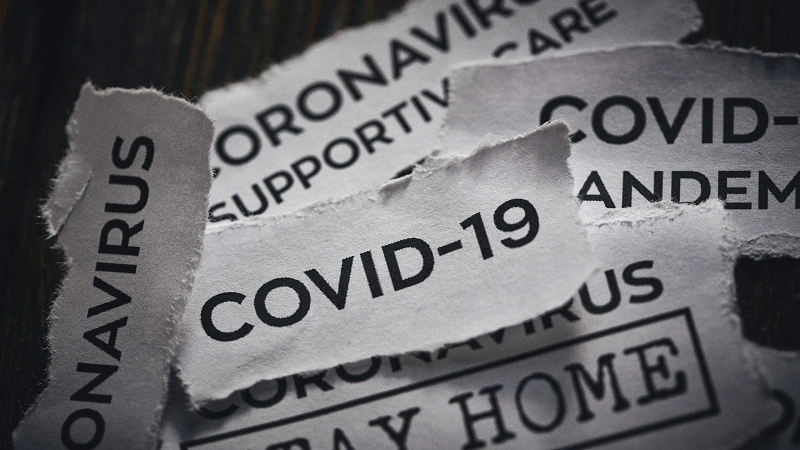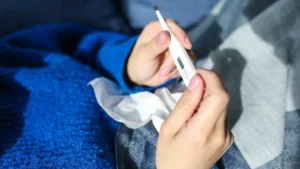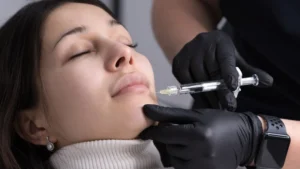As the COVID-19 pandemic continues to impact lives worldwide, it is essential to stay vigilant about its diverse array of symptoms. While fever, cough, and fatigue are well-known indicators, less common manifestations, such as ear and jaw pain on one side due to covid, are gaining attention.
Understanding the significance of this symptom is crucial because it can help in early detection and prompt medical intervention. Often, individuals experiencing these localized pains may not immediately associate them with COVID-19, potentially delaying diagnosis and necessary care.
By shedding light on this specific symptom, we aim to raise awareness, empowering people to recognize the potential connection between ear and jaw pain and COVID-19, ultimately safeguarding their health and the well-being of their communities.
Understanding Ear and Jaw Pain in COVID-19
The Connection Between COVID-19 and Localized Pain
Ear and jaw pain on one side have been reported as less common symptoms of COVID-19. Emerging evidence suggests that the virus can affect nerves in the head and neck area, leading to localized discomfort.
These symptoms may not always be immediately associated with COVID-19, making it crucial to be aware of their potential link to the virus.
Mechanism of Ear and Jaw Pain
COVID-19 can cause inflammation and affect nerve endings, leading to pain in the ear and jaw on one side.
Read More: How Much is a Heart Transplant Cost?
The virus’s impact on the nervous system can result in these specific discomforts. This symptom should not be ignored, as it could be a possible indicator of COVID-19 infection, even in the absence of more common symptoms like fever or cough.

Prevalence in COVID-19 Patients
Studies have shown that a percentage of COVID-19 patients experience ear and jaw pain on one side.
Although not as widespread as other symptoms, it is essential to recognize this manifestation to ensure timely diagnosis and appropriate care.
Distinguishing COVID-19 Related Pain
It is crucial to differentiate between regular ear and jaw pain and COVID-19-related pain. If you experience one-sided ear and jaw pain, especially in conjunction with other symptoms associated with the virus, consider seeking medical advice and testing to rule out COVID-19 infection.
Importance of Early Detection
Recognizing and understanding these less typical symptoms can lead to early detection of COVID-19, promoting timely medical intervention.
Timely diagnosis helps in managing the disease effectively and may reduce the risk of severe complications.
Seeking Medical Evaluation
If you experience persistent one-sided ear and jaw pain, consult a healthcare professional for a thorough evaluation. Early medical assessment can help determine the underlying cause and facilitate appropriate treatment.
Read More: How to Massage Ear Wax Out: A Guide to Safe and Effective Removal
Ear and Jaw Pain on One Side Due to COVID
Understanding the Symptom
COVID-19 can manifest in various ways, and one less common symptom is experiencing ear and jaw pain on one side. This localized discomfort can be concerning, especially when it occurs alongside other symptoms of the virus.
Nerve Involvement and Inflammation
The virus can impact the nerves in the head and neck region, leading to one-sided ear and jaw pain. Additionally, COVID-19 may cause inflammation in the affected area, contributing to discomfort.
The Mechanism of Pain
COVID-19 affects the nervous system, and this can lead to altered nerve signals in the head and jaw, causing pain on one side. The virus’s ability to trigger an inflammatory response can further exacerbate the discomfort.
Incidence in COVID-19 Patients
Though less common, a percentage of COVID-19 patients have reported experiencing ear and jaw pain on one side. Being aware of this symptom’s association with the virus can aid in early detection and diagnosis.
Differentiating from Other Causes
It is crucial to distinguish COVID-19 related ear and jaw pain from other causes like dental issues or ear infections.
Considering other accompanying symptoms and consulting a healthcare professional can help rule out other possible reasons.
Importance of Early Recognition
Early detection of ear and jaw pain on one side can be a potential indicator of COVID-19 infection. Recognizing this symptom promptly can lead to timely medical intervention and reduce the risk of severe complications.
Seeking Medical Evaluation
If you experience persistent one-sided ear and jaw pain, it is essential to seek medical evaluation. A healthcare professional can conduct a thorough assessment to determine the underlying cause and recommend appropriate measures.
Managing Ear and Jaw Pain at Home
Ease Discomfort with Warm Compress
Applying a warm compress to the affected area can help alleviate ear and jaw pain on one side. The warmth can relax tense muscles and reduce discomfort.
Over-the-Counter Pain Relief
Non-prescription pain relievers, such as ibuprofen or acetaminophen, can be effective in reducing mild to moderate ear and jaw pain. Follow the recommended dosage and consult a pharmacist if you have any health conditions or are taking other medications.
Rest and Relaxation
Giving your body ample rest and avoiding activities that exacerbate the pain can aid in the healing process. Avoid chewing on the affected side excessively, and try to relax your jaw muscles.
Maintaining Hydration
Staying hydrated is essential for overall health, including managing pain. Ensure you drink an adequate amount of water throughout the day to help your body recover.
Soft Diet
Eating soft foods that require less chewing can minimize stress on your jaw. Opt for soups, mashed vegetables, or smoothies until the pain subsides.
Avoiding Triggering Factors
Identify any activities or habits that worsen the pain, such as clenching your jaw or consuming hard foods, and make an effort to avoid them.
Gentle Jaw Exercises
Performing gentle jaw exercises, as advised by a healthcare professional or physical therapist, can help improve jaw mobility and reduce pain.
Relaxation Techniques
Stress and tension can exacerbate pain, so practicing relaxation techniques like deep breathing or meditation can be beneficial.
Ice Packs for Inflammation
If there is swelling or inflammation in the affected area, applying a cold pack or ice wrapped in a cloth can help reduce it.
When to Seek Medical Advice
While home remedies can help manage mild ear and jaw pain, it is essential to seek medical advice if the pain persists, worsens, or is accompanied by other concerning symptoms.
Telemedicine Consultation
Consider scheduling a telemedicine consultation with a healthcare professional if an in-person visit is not feasible. They can assess your symptoms remotely and provide guidance.
Read More: Why Ear Lobe Piercing Not Healing After 6 Months?
Medical Treatment for Ear and Jaw Pain in COVID-19
Importance of Professional Evaluation
If you experience ear and jaw pain on one side, especially in the context of COVID-19, seeking medical evaluation is crucial.
A healthcare professional can assess your symptoms, identify the underlying cause, and determine the appropriate course of treatment.
Medications for Pain Relief
Prescription pain medications may be recommended by your doctor to alleviate the discomfort associated with ear and jaw pain. These medications can help manage pain and reduce inflammation.
Anti-inflammatory Drugs
Nonsteroidal anti-inflammatory drugs (NSAIDs) may be prescribed to reduce inflammation, which can contribute to ear and jaw pain.
Muscle Relaxants
Muscle relaxants might be prescribed to ease tension in the jaw muscles, providing relief from pain.
Antibiotics for Infections
If the ear and jaw pain are caused by an infection, such as an ear infection or dental abscess, your healthcare provider may prescribe antibiotics to treat the underlying infection.
Antiviral Medications
If your ear and jaw pain are directly linked to COVID-19, antiviral medications may be considered to target the virus and help manage the symptoms.
Oral Splints
For some individuals with jaw-related pain, wearing an oral splint or mouthguard can help alleviate pressure on the jaw joint and reduce discomfort.
Physical Therapy
Physical therapy techniques, including jaw exercises and manual therapy, may be recommended to improve jaw mobility and reduce pain.
Stress Management
Stress can exacerbate ear and jaw pain, so stress management techniques such as relaxation exercises or counseling may be beneficial.
Follow-Up and Monitoring
After receiving medical treatment, it’s important to follow up with your healthcare provider for monitoring. They can assess your progress and make any necessary adjustments to your treatment plan.
Telemedicine Consultations
In situations where in-person visits may not be possible, telemedicine consultations offer a convenient way to connect with healthcare professionals for evaluation and advice.
Conclusion
In conclusion, ear and jaw pain on one side can be a less common but significant symptom of COVID-19. Understanding its connection to the virus is essential for early detection and timely medical intervention.
COVID-19 can impact the nerves and cause inflammation, leading to localized discomfort in the head and neck area.
While managing mild pain at home with warm compresses, over-the-counter pain relievers, and rest can be helpful, seeking professional evaluation is crucial for accurate diagnosis and appropriate treatment.
Medical treatment may include prescription pain medications, antibiotics for infections, antiviral medications for COVID-19 related pain, and physical therapy.
Stress management and follow-up appointments are also vital for recovery. If you experience persistent or severe pain, consult a healthcare professional for guidance.
Stay informed, be vigilant about symptoms, and prioritize your health. Early recognition and prompt medical care can play a significant role in managing ear and jaw pain in the context of COVID-19.
FAQs
1. What causes ear and jaw pain on one side in COVID-19?
COVID-19 can affect nerves and cause inflammation in the head and neck, leading to one-sided ear and jaw pain.
2. How common is this symptom in COVID-19 patients?
Though less common, a percentage of COVID-19 patients have reported experiencing one-sided ear and jaw pain.
3. Can over-the-counter pain relievers help manage this pain?
Yes, non-prescription pain relievers like ibuprofen or acetaminophen can be effective in reducing mild to moderate ear and jaw pain.
4. Is professional evaluation necessary for this symptom?
Yes, seeking medical evaluation is crucial to identify the underlying cause and receive appropriate treatment.
5. Can antiviral medications be used to treat COVID-19 related pain?
Antiviral medications may be considered to target the virus and help manage the symptoms in COVID-19 related pain.
6. How can stress management techniques help with this pain?
Stress management techniques like relaxation exercises can reduce stress-related tension and alleviate ear and jaw pain.
7. Are oral splints effective in managing jaw-related pain?
Yes, wearing oral splints can help alleviate pressure on the jaw joint and reduce discomfort in some individuals.
8. What is the importance of follow-up appointments?
Follow-up appointments allow healthcare providers to monitor progress and make necessary adjustments to the treatment plan.
9. Can telemedicine consultations be used for evaluation?
Yes, telemedicine consultations offer a convenient way to connect with healthcare professionals for evaluation and advice.
Medical References:
- World Health Organization (WHO). (2020). Clinical management of COVID-19.
- Centers for Disease Control and Prevention (CDC). (2021). Symptoms of COVID-19.
- American Dental Association (ADA). (2020). ADA Interim Guidance for Management of Emergency and Urgent Dental Care.
- Cleveland Clinic. (2021). TMJ Disorders.
- American Society of Clinical Oncology (ASCO). (2020). Stress Management.
- National Institute on Deafness and Other Communication Disorders (NIDCD). (2021). Tinnitus.



